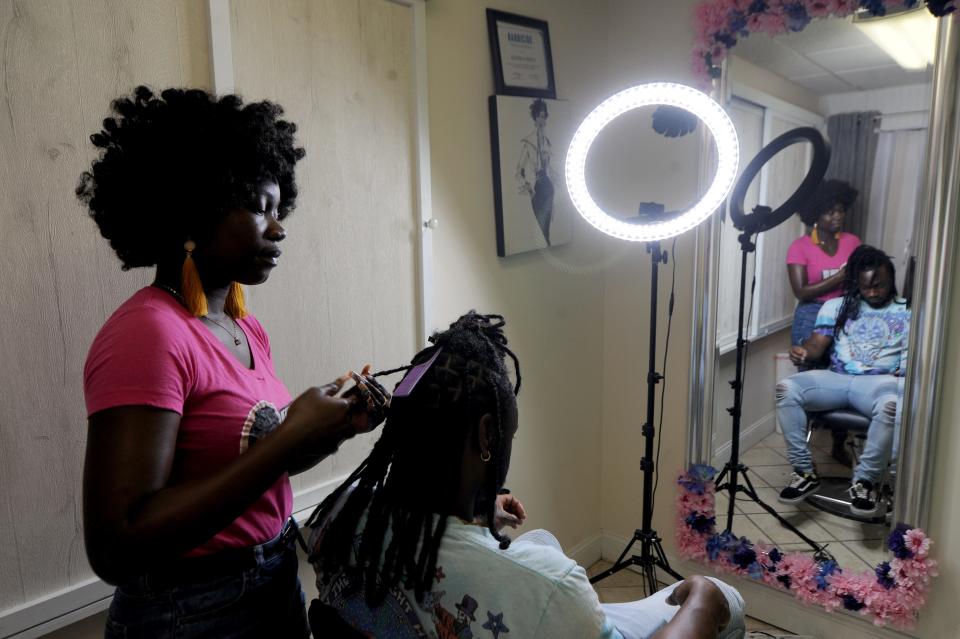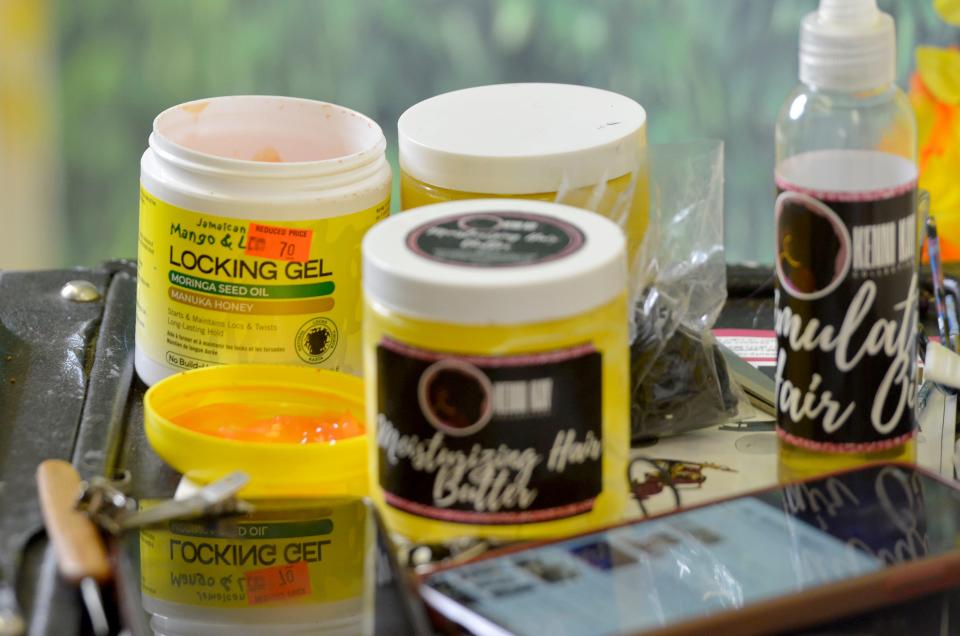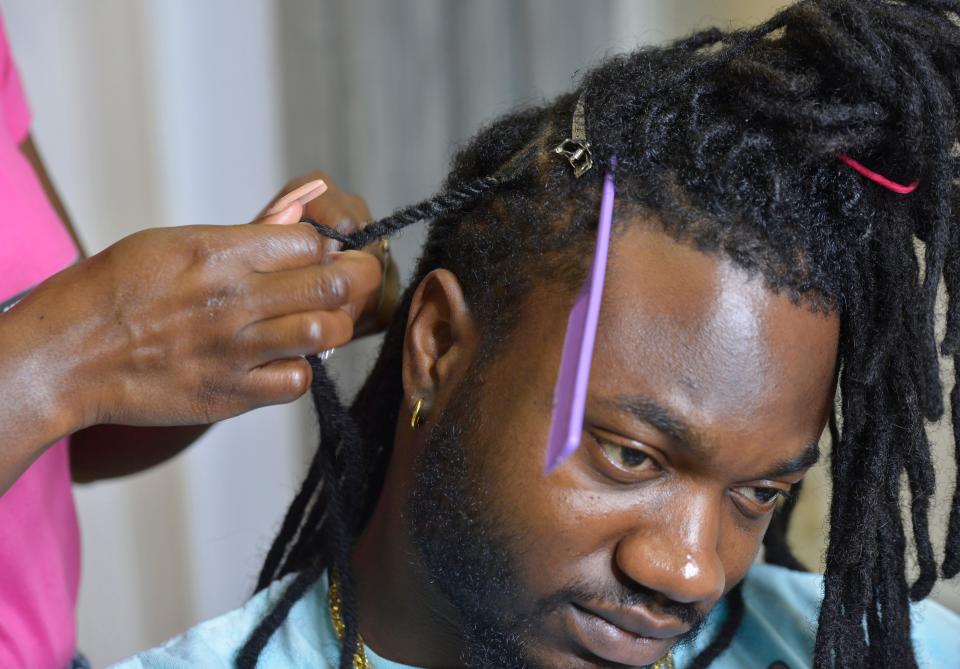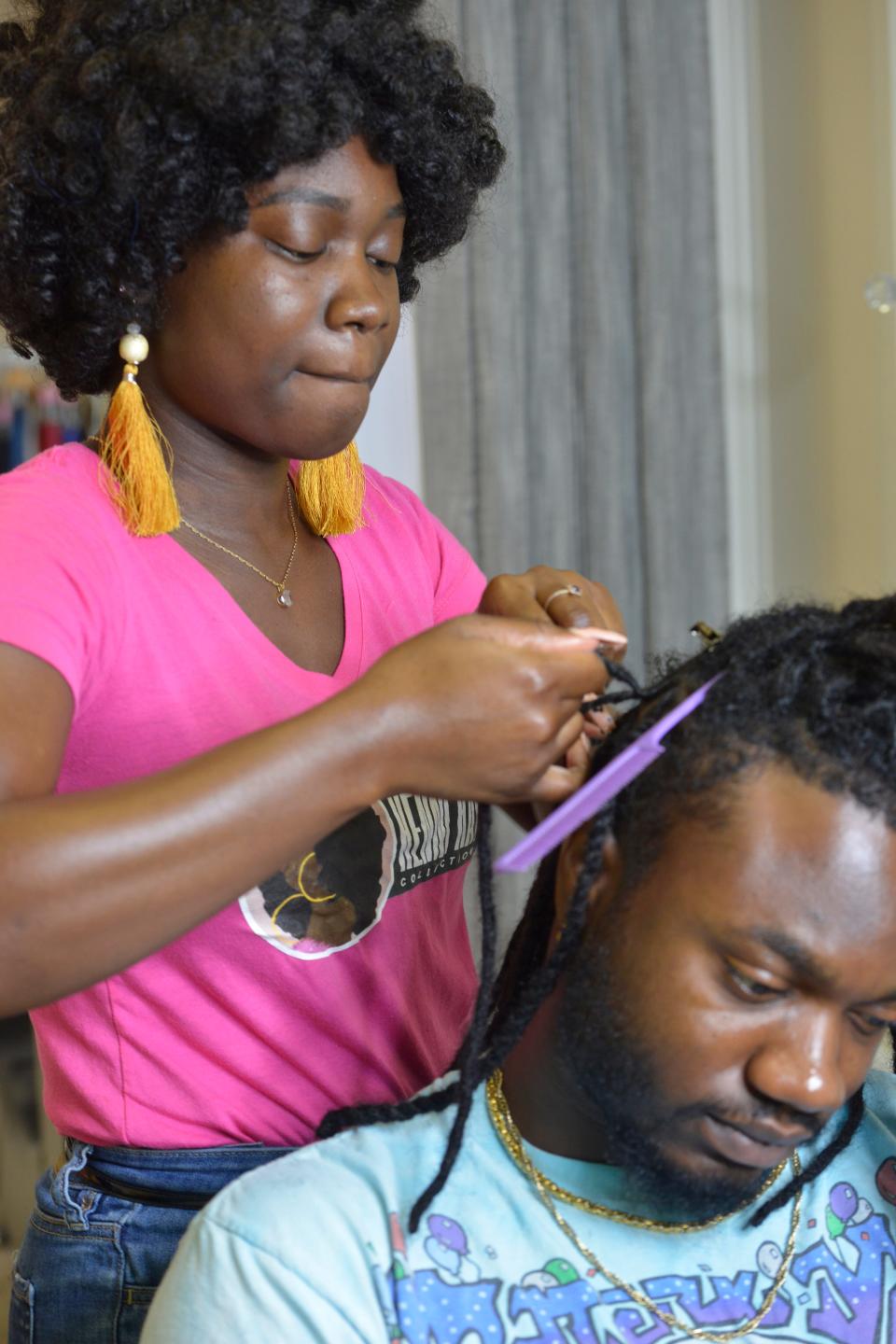The embrace of natural Black hair inspires festival in Oak Bluffs, marks cultural changes
Every weekend as a child, Tamara Chin would head to Columbia Point in Dorchester to sit at her grandmother Lucille Stewart's kitchen table to have her hair pressed.
"She used to stand right at her stove in the kitchen with the straightening comb," said Chin, owner of Hair Raising MV, an African American hair salon on Martha's Vineyard. "It smelled like hot metal and pressing oil — a pleasant, comforting smell."
The weekend ritual was part of a cultural connection between Chin and her grandmother, and the experience was part of the foundation that spurredChin's love for hair.
"It was a bond with us. I would sit right next to her, so closely that sometimes she would tell me to move back," Chin said. "I was fascinated at the manipulation and how she made hair do what she wanted it to do."

As a salon owner and stylist, Chin, who also owns a Hair Raising salon in Washington, D.C., will speak in August during a panel discussion at SOulFully Textured, A Natural Hair Festival, that will celebrate naturally textured hair.
The event — from 11 a.m. to 4 p.m., Saturday, Aug. 13, at Waban Park in Oak Bluffs — was created by Nike Okediji, founder of Curated Curl, a community group and platform for people of color to discuss their natural hair care journeys and to celebrate the beauty of natural, kinky, curly textured hair.
Black hair journeys inspire festival
With panel discussion, workshops, and Black-owned vendors, Okediji said the festival will provide opportunities for attendees to understand the cultural significance and beauty of natural hair and can support those who actively embrace their natural hair textures.
Banning ethnic hairstyles 'upholds this notion of white supremacy.' These states are passing laws to stop it
Through a Curated Curl Facebook group, she said she's been able to talk about all things related to natural hair journeys — from hair care products and routines, to hairstyles, to how to eradicate discrimination and stigma associated with Afro-textured natural hair. The festival, she said, is an extension of these endeavors.
"This is a family fun environment where we can celebrate the natural hair that grows out of our head," she said. "So we can support one another and have these conversations."
Okediji, who also holds annual SOulFully Textured festivals in Boston, said the idea behind Curated Curl came after she began her own transition to naturally textured hair.

"As a woman of color, I grew up having my hair processed," she said. "I really didn’t know my own hair texture."
During that time, some of her friends were also transitioning from processed to natural hair, said Okediji, and they began discussing their anxieties over wearing their natural hair to work or to school.
"We really should not feel this way about our own hair — questioning whether it's OK to wear our natural hair in the workplace," she said. "That was the impetus to start the online hair community."
Textured hair induces anxiety at the work place
Gillian Scott-Ward, a clinical psychologist, said she noticed similar issues when she was working with students at a New York City university. Scott-Ward is now scheduled to share her insights during a panel discussion and healing workshop at the August festival.
More: Oak Bluffs Select Board and NAACP clash over flying of Juneteenth flag
"Many students were exhibiting anxiety over internships and job interviews," she said. "But what was really unique for Black women, across the diaspora, was they were worried about their presentation and how their hair would impact ability to get jobs and internships."
At the time, Scott-Ward was also transitioning between the perm she maintained for most of her life to naturally textured hair.

"My hair was permed probably from age 8 or younger. I didn't even know what my texture was," she said. "I wanted to grow it out with braids so I could like slowly begin to understand how to handle it. Unfortunately that did not happen."
Shortly into the transition, Scott-Ward tried to unravel her braids, and her hair became tangled into a knot that she said couldn't be remedied.
'Welcoming for all': Juneteenth celebrations involve history, music, film and a Vineyard jubilee
"I just had to cut off all my hair unexpectedly," she said. "That was a big shift. All of a sudden, I'm facing myself and seeing myself in this authentic way that was really jarring."
"Back to Natural"
While the trials and tribulations surrounding her hair were difficult, aspects of her hair journey were captured on film, and she created and directed the 69-minute documentary "Back to Natural," which focuses on how hair is connected to politics, and racial identity in Black communities and beyond.
"I created this film to help people understand the relationship people have with their hair across cultures," she said. "And understand how history plays into that."
During the film's creation, Scott-Ward said she traveled as far as South Africa to interview women of color about their thoughts on natural hair and said she began to understand universal themes that center whiteness in terms of beauty standards. Scott-Ward advocates for healing what she calls "intergenerational trauma," by understanding the relationship people have with their hair and how that's passed along in their family units.
At the August festival, Scott-Ward expects to touch upon the film's call for healing and its grassroots approach to exploring the globalized policing of natural Black hair.
"Unless we begin to help people of all races, of all ethnicities, of all cultures understand and dissect their automatic thoughts and processes when they see natural hair then we're going to be locked into the biases that were created for the last couple hundred of years," she said. "This is all about the inferiority of blackness and black features."
Legal protections for natural hair
In 2019, Scott-Ward also used her film as a platform to work with the New York City Commission on Human Rights to create regulations that protect against natural hair bias in schools and in the workplace. It also worked to give legal recourse to those who are harassed, punished or fired because of their hair styles, she said.
More: Discrimination based on hair banned in new Massachusetts law, here's how it got done
"Those guidelines connected the fact that hair texture and hair style is connected to race and therefore any discrimination against hair is racial discrimination," she said. "That was a huge milestone."
The CROWN Act, which stands for Creating a Respectful and Open World for Natural Hair, was also introduced into Congress in 2021 by Rep. Bonnie Watson Coleman of New Jersey, and was introduced to the Senate in March 2022. If passed, the law will prohibit race-based hair discrimination, said Scott-Ward.
Local stylists advocate for natural hair
Keniqua Smith, a black hair stylist at Diva's Beauty Studio in Hyannis, calls her own natural hair her "crown," and said she's dismayed when clients worry about how their hair will affect their ability to be hired for office positions.
Such concerns also pertain to maintaining their job should they transition to natural hair after hired. Straight and processed hair is what's deemed professional in corporate environments, but that's changing, she said.
Celebrating hair and art: Two friends wanted to celebrate Black hair. So they created an art exhibit.
"From when I first moved here (to the Cape) in 2016, natural hair is becoming a popular thing," she said. "A lot of my clients are transitioning to natural hair or to dread(locks) and natural hair styles are thriving and are more acceptable."
Smith, who has never chemically straightened her hair, said there's been societal pressures for Black women to keep their hair permed.
"A lot of girls would stick to the weaves, and the sew-ins because society has painted a picture that if you don’t have straight, long hair, you're not beautiful," she said.

Smith's mother maintained her own hair with relaxers for so long that eventually she suffered from hair loss and sores developed throughout her scalp. It was only through the creation of a hair oil that contains ingredients like almond and peppermint oil, and rose petals, that Smith was able to coax her mother's scalp back to health. Smith now sells the oil through her company Kenni Kay Collection.
"It's because of this kind of experience, that I am seeing women embracing their natural hair and protective styles more often," she said. "We are learning to love the skin that we're in naturally."
While Chin offers silk press services for women with natural hair, she is wary of natural styles being projected as the only option for women of color when it comes to their hair. Relaxing treatments, she said, are often looked at negatively, but can be used safely if they're maintained responsibly.
Natural hair is not for everyone, and dependent on lifestyle, says one stylist
"Natural hair is not for everyone," she said. "For us, I really believe it's all in the conditioning and consistency. It's really more about knowing and being realistic about what fits into your lifestyle."
Yarmouth resident Erica Gomes works as a Black hair stylist on commercial and ad sets throughout the New England area for Ennis Inc. and said more businesses are accepting textured hair. But she said these affirmations were only motivated in the last two years, by social justice and human rights movements surrounding Black Lives Matter and justice for George Floyd initiatives. Previously, she said, the ad industry was slow to make change.
Why is natural hair growing in Hollywood and beyond?: A look at the statement-making style
Gomes, who was adopted and is of Puerto Rican descent, went through a period of learning how to care for her textured hair, and said she encourages her own children to be proud of who they are and consistently reinforces lessons of love for the hair on their heads.
In addition, Gomes offers free weekly or bi-weekly hair services at her home-based studio for children in the foster care system who are in homes with guardians that didn’t know how to style textured hair.
“I want to be helpful. I want them to walk away smiling and feeling good about themselves and their hair,” she said "It’s also empowering for parents to learn about their hair and it helps break down the barriers and stigmas associated with textured hair."
This article originally appeared on Cape Cod Times: Martha's Vineyard Black hair salon owner creates festival

